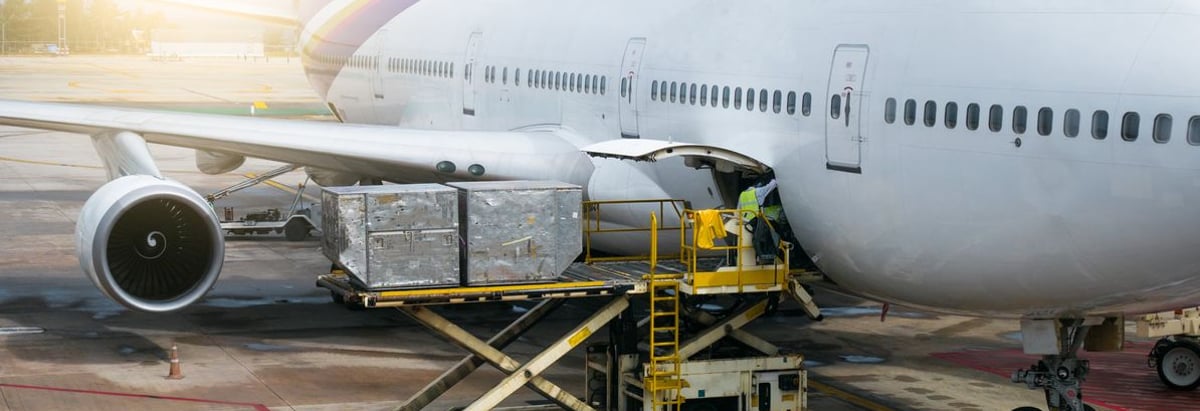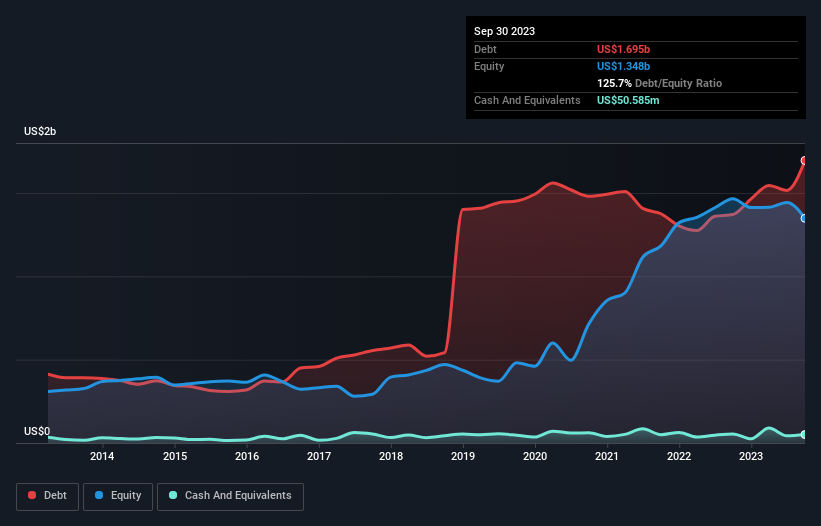Stock Analysis
- United States
- /
- Logistics
- /
- NasdaqGS:ATSG
Air Transport Services Group (NASDAQ:ATSG) Has No Shortage Of Debt

David Iben put it well when he said, 'Volatility is not a risk we care about. What we care about is avoiding the permanent loss of capital.' When we think about how risky a company is, we always like to look at its use of debt, since debt overload can lead to ruin. Importantly, Air Transport Services Group, Inc. (NASDAQ:ATSG) does carry debt. But should shareholders be worried about its use of debt?
When Is Debt A Problem?
Generally speaking, debt only becomes a real problem when a company can't easily pay it off, either by raising capital or with its own cash flow. Ultimately, if the company can't fulfill its legal obligations to repay debt, shareholders could walk away with nothing. However, a more common (but still painful) scenario is that it has to raise new equity capital at a low price, thus permanently diluting shareholders. By replacing dilution, though, debt can be an extremely good tool for businesses that need capital to invest in growth at high rates of return. When we think about a company's use of debt, we first look at cash and debt together.
View our latest analysis for Air Transport Services Group
How Much Debt Does Air Transport Services Group Carry?
The image below, which you can click on for greater detail, shows that at September 2023 Air Transport Services Group had debt of US$1.70b, up from US$1.37b in one year. However, it does have US$50.6m in cash offsetting this, leading to net debt of about US$1.64b.

How Healthy Is Air Transport Services Group's Balance Sheet?
The latest balance sheet data shows that Air Transport Services Group had liabilities of US$393.6m due within a year, and liabilities of US$2.10b falling due after that. On the other hand, it had cash of US$50.6m and US$226.1m worth of receivables due within a year. So it has liabilities totalling US$2.22b more than its cash and near-term receivables, combined.
This deficit casts a shadow over the US$1.01b company, like a colossus towering over mere mortals. So we definitely think shareholders need to watch this one closely. At the end of the day, Air Transport Services Group would probably need a major re-capitalization if its creditors were to demand repayment.
We use two main ratios to inform us about debt levels relative to earnings. The first is net debt divided by earnings before interest, tax, depreciation, and amortization (EBITDA), while the second is how many times its earnings before interest and tax (EBIT) covers its interest expense (or its interest cover, for short). The advantage of this approach is that we take into account both the absolute quantum of debt (with net debt to EBITDA) and the actual interest expenses associated with that debt (with its interest cover ratio).
Air Transport Services Group has a debt to EBITDA ratio of 2.9 and its EBIT covered its interest expense 3.7 times. Taken together this implies that, while we wouldn't want to see debt levels rise, we think it can handle its current leverage. Worse, Air Transport Services Group's EBIT was down 23% over the last year. If earnings continue to follow that trajectory, paying off that debt load will be harder than convincing us to run a marathon in the rain. When analysing debt levels, the balance sheet is the obvious place to start. But ultimately the future profitability of the business will decide if Air Transport Services Group can strengthen its balance sheet over time. So if you're focused on the future you can check out this free report showing analyst profit forecasts.
But our final consideration is also important, because a company cannot pay debt with paper profits; it needs cold hard cash. So it's worth checking how much of that EBIT is backed by free cash flow. Over the last three years, Air Transport Services Group recorded negative free cash flow, in total. Debt is far more risky for companies with unreliable free cash flow, so shareholders should be hoping that the past expenditure will produce free cash flow in the future.
Our View
To be frank both Air Transport Services Group's EBIT growth rate and its track record of staying on top of its total liabilities make us rather uncomfortable with its debt levels. And furthermore, its interest cover also fails to instill confidence. Considering all the factors previously mentioned, we think that Air Transport Services Group really is carrying too much debt. To our minds, that means the stock is rather high risk, and probably one to avoid; but to each their own (investing) style. The balance sheet is clearly the area to focus on when you are analysing debt. However, not all investment risk resides within the balance sheet - far from it. These risks can be hard to spot. Every company has them, and we've spotted 2 warning signs for Air Transport Services Group you should know about.
If, after all that, you're more interested in a fast growing company with a rock-solid balance sheet, then check out our list of net cash growth stocks without delay.
New: Manage All Your Stock Portfolios in One Place
We've created the ultimate portfolio companion for stock investors, and it's free.
• Connect an unlimited number of Portfolios and see your total in one currency
• Be alerted to new Warning Signs or Risks via email or mobile
• Track the Fair Value of your stocks
Have feedback on this article? Concerned about the content? Get in touch with us directly. Alternatively, email editorial-team (at) simplywallst.com.
This article by Simply Wall St is general in nature. We provide commentary based on historical data and analyst forecasts only using an unbiased methodology and our articles are not intended to be financial advice. It does not constitute a recommendation to buy or sell any stock, and does not take account of your objectives, or your financial situation. We aim to bring you long-term focused analysis driven by fundamental data. Note that our analysis may not factor in the latest price-sensitive company announcements or qualitative material. Simply Wall St has no position in any stocks mentioned.
About NasdaqGS:ATSG
Air Transport Services Group
Provides aircraft leasing, and air cargo transportation and related services in the United States and internationally.
Fair value with limited growth.

